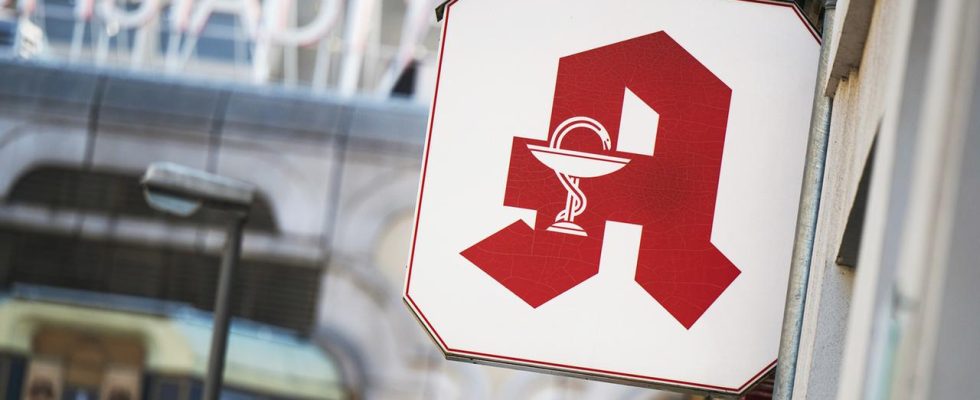Although the legislator wanted to prevent it, the number of medical practices that are under the economic influence of pharmacists is growing. It’s about lucrative business, especially with expensive cancer drugs. Minister Lauterbach sees dangers for patients.
More than 100 medical care centers (MVZ) are now directly or indirectly in the hands of a few pharmacists. This is shown by a Germany-wide analysis of WDR, NDR“Süddeutsche Zeitung” and the ARD-Magazine monitor.
This is apparently also due to the high profit margins that pharmacists can achieve with prescriptions for cancer drugs, among other things. With the preparation of a single infusion bag for cancer patients, pharmacists can earn several hundred, sometimes even thousands of euros in just a few minutes, as research by NDR, WDR, SZ and monitor showed. The prescriptions for the cancer drugs are correspondingly popular with the pharmacists who prepare the infusion bags.
Creative circumvention of the purchase ban
In the past, cases have repeatedly come to light in which individual pharmacists are said to have even bribed cancer doctors in order to get the prescriptions. Another way of benefiting from well-paid cancer infusions is for pharmacists who produce cancer therapies to buy a medical supply center (MVZ) with cancer doctors.
Since 2012, pharmacists have not been allowed to set up such MVZs. Only doctors themselves, hospitals, dialysis centers or municipalities are allowed to do this. However, some pharmacists have apparently found a creative way of circumventing this ban: for example, by buying shares in a company, which in turn can then operate numerous MVZs.
danger to patients
Health Minister Karl Lauterbach (SPD) wants to prevent such business models in the health care system, which are increasingly attractive to financial investors who want to benefit from them. He says it should “basically not be allowed” for pharmacists to acquire medical practices through holdings in medical care centers. “We don’t want any MVZ operated by investors, especially not where the investor is a pharmacist,” says Lauterbach in an interview NDR, WDRSZ and monitor. Because a “mixture with prescription profits that are astronomical” also harbors a danger for patients if, in the end, certain cancer drugs are only used “because they generate the most profit compared to their better alternatives”.
The chairman of the Medicines Commission of the German Medical Association, Wolf-Dieter Ludwig, also sees the danger of a harmful incentive system: “If there are these MVZ, where doctors practically only hand over the prescriptions to a pharmacy, there is at least theoretically the possibility that a doctor will prescribe medicines that promise a particularly high profit than medicines that may be just as effective, but where the profit is significantly lower because these preparations have been on the market for a long time.” In order to prevent these conflicts of interest, Ludwig considers a strict separation of medical practices and pharmacies to be essential.
suspected bribery and fraud
This strict separation is also the subject of an investigation that has been under investigation since 2019 against three pharmacists who are associated with the Hamburg manufacturing company Zytoservice. There are also allegations of healthcare bribery and fraud. It is the presumption of innocence.
It is one of the largest ongoing investigations in the healthcare sector. The focus is on more than 40 people, including doctors, who are suspected of being bribed. Zytoservice is said to have illegally founded medical care centers, although pharmacists have not been allowed to do so since 2012.
Direct access to lucrative recipes?
According to the public prosecutor’s office, the accused were basically concerned with the company acquiring doctor’s seats by participating in MVZ – in order to be able to gain direct access to the doctor – and thus also to lucrative prescriptions – in return for economic advantages. But because they were aware that exactly that is not allowed, they decided to circumvent this rule and cover up their involvement, the public prosecutor believes.
The accused pharmacists decided to buy a mini-clinic through Zytoservice: the district clinic in Hamburg. The magazine “Stern” reports that the holdings were later changed several times and the structure rebuilt, so that the pharmacists who originally founded Zytoservice moved further away from holdings in the district clinic, at least on paper.
The district clinic now operates at least 19 medical care centers (MVZ) in Germany. The Federal Minister of Health also criticizes the desired separation of doctor’s practice and pharmacy.
Exculpatory Opinions
A lawyer rejects the allegations as unjustified for two of the three pharmacists. It is merely an investigation hypothesis of the public prosecutor’s office, which has not been confirmed by any investigation result. There are numerous exculpatory opinions. It is assumed that the procedure will be discontinued. All MVZ would eventually have received all the necessary official approvals. The third accused pharmacist did not respond to a request to this effect.
Irrespective of the question of legality, the Association of Pharmacists Manufacturing Cytostatics (VZA) confirms an increase in large manufacturing companies in the industry. The scientific institute of the AOK (WIdO) has exclusively for NDR, WDRSZ and monitor calculated how many cancer infusions in Germany are no longer manufactured in the local pharmacy and instead come from a large manufacturing company, sometimes associated with much longer travel times. Last year, nationwide, more than a third of all cancer infusions came from such large manufacturing companies.
The association of cytostatics manufacturers is critical of the upheavals in the industry. A large number of cytostatic drug pharmacies have had to give up in recent years because doctors have given their prescriptions to large manufacturing companies or hospital pharmacies, says VZA President Klaus Peterseim. He did not want to speculate about the motives.
Peterseim also warns of dangers for patients: “The more of these independently run pharmacies disappear from the market, whose manufacturing laboratories are no longer available to supply the population, the worse, the more dangerous for the people who depend on something like that.”

